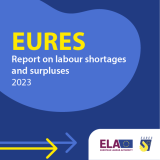ELA coordinates the European network of employment services (EURES). EURES provides information and employment support services for jobseekers, workers, and employers, and by enhancing cooperation and information exchange between EURES Members and Partners organisations.
The EURES service for instance:
- makes available over 1,000 EURES Advisers who assist jobseekers in 31 countries, offering tailored recruitment support and access to a diverse database of 1 million CVs and 3.8 million job vacancies via EURES portal;
- provides information, guidance and other support services (including post-recruitment assistance) for workers and employers;
- facilitates jobseeker-employer connections via European Online Job Days and provides information on living/working conditions and labour market insights.
- offers the Targeted Mobility Scheme with support and financial assistance to EU/EEA jobseekers, while EURES partnerships aid cross-border mobility through information sharing and skills programs;
- offers a chat function with EURES Advisers for direct support and access to a helpdesk for personalised assistance on navigating the EURES portal and services.
Facts and figures
Around 1000 EURES advisers support interested jobseekers and employers, including 3,9 million jobs, 1 million CVs and 5 thousands employers registered on EURES portal.
27 European job days events supported in 2023.
82 training sessions for EURES Network staff delivered in 2023.
How to
Create your EU Login account
Before registering on EURES as a jobseeker or employer.
Take part to European Job days
Meet employers and get insights about your next destination country!
Find a job in Europe!
Search for a job in EURES portal!
Register on EURES as a jobseeker
Only if you already have an EU Login account.
Register on EURES as an employer
Only if you already have an EU Login account.
Apply for EURES membership!
Become a EURES member, through your National Coordination Office, to have access to post-recruitment assistance, including language training and collaborate with EURES partners across Europe.
Governance of the EURES network
The activities of the EURES network are supported by the European Coordination Office (ECO) managed by the European Labour Authority. Each participating country (31) designates a National Coordination Office (NCO), generally linked to either their Public Employment Services (PES) or their Ministry of Labour. All NCOs, the European Commission and ECO are exchanging information and supporting the implementation of the EURES Regulation in the EURES Coordination Group (ECG). Representatives of the social partners at EU level have the right to attend the meetings of the ECG.
The European Commission remains an important partner of the EURES network. The political steer including legislation, reporting, evaluation, and grant management remain under the Commission framework.
EURES Coordination Group
The mission of the EURES Coordination Group is to exercise a coordinating role with regard to the activities and functioning of the EURES network. It serves as a platform for the exchange of information and for the sharing of best practices, in particular regarding the development and dissemination across the EURES network of appropriate information and guidance to workers, including frontier workers, and employers. The Coordination Group shall support the implementation of Regulation (EU) 2016/589 by exchanging information and developing guidance.


